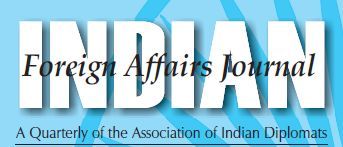
Indian Foreign Affairs Journal Vol. 8, No. 4, October–December 2013, 413-427
Download full article here.
———-
India’s rise constitutes one of the most fascinating and important stories of the past two decades, symbolizing, along with China, the fundamental shift of power towards Asia. Yet, while many acknowledge India’s newfound importance, the country remains one of the most misunderstood actors in the international community. During the Cold War, India was the only democratic regime that did not align with the West. After turning into a nuclear power in 1998, the country suffered international condemnation, only to become one of the USA’s strategic partners less than ten years later – largely in the hope that it would balance China’s rise in the region.
India’s relationship to multilateral institutions is highly complex and, as this analysis seeks to show, its multilateral strategy is closely tied to its evolving identity and world view. Today, no global challenge – be it climate change, nuclear proliferation or poverty reduction – can be tackled successfully without India’s active contribution and engagement. Thus, the need to understand India’s perspective has never been greater.
The Indian Paradox
At first sight, there are many reasons to be optimistic about India: it boasts one of the world’s most dynamic economies, driven by a growing group of sophisticated entrepreneurs capable of competing globally. India has experienced unprecedented growth and stability since the end of the Cold War, and is expected to turn into one of the world’s five largest economies by the end of the decade. Given that the country finally seems to be capitalizing on its potential, several analysts have proclaimed the “Indian Century”, and the government is ever more confident in its claim for a permanent seat on the UN Security Council, as well as more responsibility in institutions such as the International Monetary Fund (IMF) and the World Bank.
At the same time, India is now the world’s largest arms importer, further boosting its international profile and potential role in security affairs in the Indian Ocean. Due to its democratic credentials, soft power, and reputation as a benign international actor, a consensus has emerged in the West that India is the world’s best hope to balance a rising China, both in the region and, at a later stage, in global affairs. Reflecting this, the USA’s recognition of India as a nuclear power – a move that risked weakening the Non-Proliferation Treaty (NPT) – was unprecedented, and showed how important India has become.
However, India’s global aspirations are starkly contrasted by the enormous difficulties it faces both at home and abroad, severely restricting its foreign policy choices. With over 300 million Indians living below the poverty line and growing economic inequalities, India’s rise has yet to translate into tangible benefits for the poor, most of whom live in rural areas. The Maoist Naxalite insurgency, affecting large swathes of the country, has rightly been identified by the government as the India’s most serious security concern, sapping the government’s authority to take the country forward. Yet, the insurgents’ continued presence can be explained precisely because growth has not been sufficiently distributive. These issues have immediate relevance for Indian multilateralism: widespread rural poverty is, until today, a determining factor in India’s negotiation strategy in international institutions such as…
Download full article here.
Read also:
Novo livro: “A Índia na Ordem Global”
What would India’s Foreign Policy under Modi look like?
Reseña: India in Africa: Changing Geographies of Power (Mawdsley & McCann)
Why is there still no IBSA free trade agreement?








